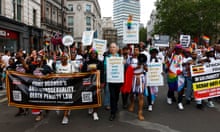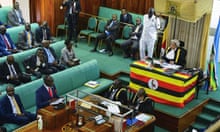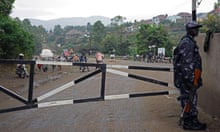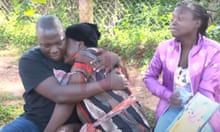Bobi Wine, a popular reggae star and prominent opposition MP in Uganda, has launched a new political party before presidential polls scheduled for early next year.
Wine, whose real name is Robert Kyagulanyi Ssentamu, described the move as “yet another important step in our liberation struggle” and said he hoped to unite the fragmented opposition seeking to oust Yoweri Museveni, 75, who has been in power since 1986.
“We believe in having a platform that will bring in all oppressed Ugandans,” the 38-year-old singer and activist said in a statement.
Wine is one of a new generation of politicians across Africa who are challenging long-time leaders, hoping to harness deep dissatisfaction among younger, more educated and often urban voters.
However, analysts say incumbent leaders benefit from powerful patronage networks, long-established political machines and links to big business, as well as support from the military or other security forces.
Since he became a legislator in 2017, Wine has rattled the Ugandan authorities. He has been badly assaulted and arrested or detained many times, including over a treason charge that he denies. With political rallies nowbanned, presidential aspirants are faced with police and intelligence services determined to break up anti-government gatherings.
Museveni, who has indicated he will run again for president, has accused Wine of trying to incite rioting – a charge he also denies.
Wine said the struggle of the African National Congress against apartheid in South Africa had been an inspiration.
“What we are doing today is to launch a political wing of our movement so as to ensure that our mission to use the election as a strategy within the liberation struggle succeeds,” his statement read.
Wine has repeatedly called on Museveni to retire, saying young people must prepare to take over leadership of the east African nation. He is calling his new party the National Unity Platform, with an umbrella as its emblem.
The singer came to political prominence nationally in 2017 when, as an independent candidate, he won election as a lawmaker representing a constituency near Kampala. He has since successfully campaigned on behalf of other opposition candidates, raising his profile and attracting encouragement to run for president.
In March, Wine released a song to help efforts to stem the spread of coronavirus in Uganda.
A controversial figure, he has faced repeated accusations of homophobia but remains the most significant challenger to Museveni.
“If Bobi Wine cannot lead Uganda but he is the politician voters want to lead them, I do not know what anyone can do about this. Abolish democracy? Change the constitution? Jump into Lake Victoria?” said Musaazi Namiti, a columnist writing in the local Daily Monitor newspaper. “Now is the time for Bobi Wine to test his popularity. He should be the candidate.”

Namiti expressed some scepticism about Wine’s chances of winning, however: “It is going to take something of a miracle for Uganda to see a political leader other than Mr Museveni in the State House.”
Museveni is eligible to seek another term next year after lawmakers removed constitutional age limits on the presidency. The former rebel leader’s party insists he remains its most popular member.
Opponents say corruption is thriving in Uganda and accuse Museveni of personalising power through his firm grip on the military, the most powerful institution in the country.
The army has become even more influential amid the coronavirus pandemic as men in military uniform enforce lockdown measures, sometimes with brutal force.
Kizza Besigye, a four-time presidential challenger who has not yet revealed his plans, and Wine announced what they termed an alliance in June, although it remains unclear whether one will back the other to run.














